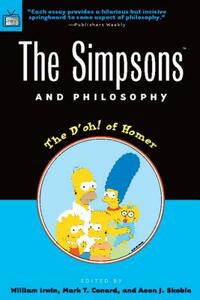Take a photo of a barcode or cover
35 reviews for:
The Simpsons and Philosophy: The D'Oh! of Homer
Mark T. Conard, William Irwin, Aeon J. Skoble
35 reviews for:
The Simpsons and Philosophy: The D'Oh! of Homer
Mark T. Conard, William Irwin, Aeon J. Skoble
This series of essays claim to use the Simpsons as a way to get the layperson to read more philosophy, and does a patently terrible job of it. As a Simpsons fan more than a philosopher, I found myself frankly bored for most of the book, and concerned that some authors were wilfully misinterpreting episodes. In fact, several authors did not seem to enjoy the Simpsons at all. For example, one essay tries to talk about hyper-irony, but then halfway through, randomly picks on the episode with the death of Bleeding Gums Murphy as one that "truly deserves the Simpsonian epithet "worst episode ever"". Really? Ever? What does that even have to do with your topic? I truly agree with another reviewer's conclusion that this is a book written by people that want to show you how smart they are. "I am so smart! Much smarter than you!" - Comic Book Guy
Creo que un 2,5, aprobado justito.
A ver, si te gustan Los Simpson y los conoces bien, te va a gustar la visión que tienen de algunos episodios, pero lo cierto es que apenas rascan la superficie. Además, se vuelve reiterativo porque sólo utilizan un puñado de episodios, habría sido mucho más interesante que se centrasen en esos episodios en lugar de dar vueltas en círculos tratando de hacer el ensayo tan "serio". El capítulo sobre Marge y el feminismo es un suspenso clarísimo (ni siquiera tengo claro que haya una mujer entre el campo de nabos de lo ha escrito y editado).
A ver, si te gustan Los Simpson y los conoces bien, te va a gustar la visión que tienen de algunos episodios, pero lo cierto es que apenas rascan la superficie. Además, se vuelve reiterativo porque sólo utilizan un puñado de episodios, habría sido mucho más interesante que se centrasen en esos episodios en lugar de dar vueltas en círculos tratando de hacer el ensayo tan "serio". El capítulo sobre Marge y el feminismo es un suspenso clarísimo (ni siquiera tengo claro que haya una mujer entre el campo de nabos de lo ha escrito y editado).
The Simpsons and Philosophy: The D'oh! of Homer (Popular Culture and Philosophy) by William Irwin (2001). Overall not a bad read, it gets a bit thick at times in the philosophy, somewhat self-serving in a few of the essay's. But if you are a fan of the Simpsons, and have a decent background in philosophy, this will make you think.
The Simpsons and Philosophy is the second in a now lengthy series of volumes of essays centered around various icons of popular culture. I've also read one of the other volumes - Monty Python and Philosophy. Like the Monty Python collection, the Simpsons collection of essays are uneven. Some are quite interesting, some are confusing and some are just unconvincing. Unfortunately, I found the interesting ones to be in the minority. A few of these also stood in contrast to each other, so it was doubly interesting to think about them in the context of the other. Not sure that made up for the less compelling ones, though. Also notable, is that I really think a significant number of the essays were less philosophy and more cultural/artistic analysis. Now, some of these were among the best pieces in the collection, but not really what the title of the book (or series, for that matter) promises.
This book sat on my shelf for twenty years. It does a very good job of applying concepts to The Simpsons. Most of the essays are very easy to read without a philosophy background. However the last two are quite advanced, but it was a good finish to the book to have challenging material.
Este libro se compone de distintos ensayos que ofrecen un panorama más amplio de porqué Los Simpson no es sólo una caricatura infantil, sino que, tal vez sin querer (o quizás a propósito), se ha vuelto un estudio y análisis sobre nuestra sociedad.
El libro se divide en cuatro partes, con un total de 18 ensayos que abordarán a cada uno de los miembros de la familia Simpson, los temas relevantes de la serie y su relación con la filosofía; el cómo se manejan los temas de ética (sin caer en moralismos), además de algunos actantes secundarios pero que son parte de la serie.
Aunque me agrada leer sobre filosofía, hubo términos y explicaciones que se me complicaba comprender, incluso aún con lo que los autores brindaban para su fácil entendimiento.
Lo que me agradó fue como se daban las explicaciones a los temas y situaciones con los episodios y diálogos de la serie, eso hizo que en más de una ocasión fuera a ver los capítulos para ver con detenimientos los aspectos filosóficos antes explicados.
Los ensayos se pueden leer por separado y no hay ningún problema de seguimiento, pero hay vari0s que llegan a complementarse por el trato que le dan al personajes o la cuestión filosófica que siguen a su alrededor.
Sin duda es un libro que todos los fanáticos de Los Simpson debemos leer. A continuación comparto mis ensayos favoritos:
"Lisa y el antiintelectualismo estadounidense"
"La motivación moral de de Marge"
"Los Simpson y la política del sexo"
"La función de la ficción: el valor heurístico de Homero"
"Y el resto sale por la lógica: Roland Barthes ve Los Simpson"
El libro se divide en cuatro partes, con un total de 18 ensayos que abordarán a cada uno de los miembros de la familia Simpson, los temas relevantes de la serie y su relación con la filosofía; el cómo se manejan los temas de ética (sin caer en moralismos), además de algunos actantes secundarios pero que son parte de la serie.
Aunque me agrada leer sobre filosofía, hubo términos y explicaciones que se me complicaba comprender, incluso aún con lo que los autores brindaban para su fácil entendimiento.
Lo que me agradó fue como se daban las explicaciones a los temas y situaciones con los episodios y diálogos de la serie, eso hizo que en más de una ocasión fuera a ver los capítulos para ver con detenimientos los aspectos filosóficos antes explicados.
Los ensayos se pueden leer por separado y no hay ningún problema de seguimiento, pero hay vari0s que llegan a complementarse por el trato que le dan al personajes o la cuestión filosófica que siguen a su alrededor.
Sin duda es un libro que todos los fanáticos de Los Simpson debemos leer. A continuación comparto mis ensayos favoritos:
"Lisa y el antiintelectualismo estadounidense"
"La motivación moral de de Marge"
"Los Simpson y la política del sexo"
"La función de la ficción: el valor heurístico de Homero"
"Y el resto sale por la lógica: Roland Barthes ve Los Simpson"
challenging
dark
funny
informative
inspiring
reflective
slow-paced
Reading Level: Adult. Seeing this title mentioned in one of my textbooks became the impetus for this collection subject. I used to be a huge Simpson’s fan, and after some searching online, I discovered there are a whole lot of books based on popular culture and philosophy. I expected something silly and light-hearted, with lots of pictures of the Simpson characters.
Instead, this title has no pictures and is actually quite a serious read on philosophy. Fans of the show will get the most mileage from this title, since all of the chapters refer to the characters and oftentimes to specific scenes in certain episodes. I would recommend this one more to teens that have already studied a bit of philosophy than those that have never been introduced to it, for the book dives in right away. Homer is looked at from the perspective of Aristotle’s philosophy. In a chapter on Bart, Nietzsche’s viewpoint is examined in regards to the proverbial trouble-maker. Each chapter is written by someone different, who all seem to vary in their knowledge of the Simpson’s universe.
Some focus more on the philosophy, some discuss the show so much that I was tempted to re-watch some old favorites, and the best combine both of these worlds. For the teen that is ready to sink their teeth into something a bit more challenging, this will fit the bill. The backmatter consists of episode titles, (with their original airdate), a list, with a brief description, of the philosophers the chapters are based on, a summary of the chapter authors and their qualifications, an index, and an ad for another book by the publisher. This book does not need to be read in any certain order.
Instead, this title has no pictures and is actually quite a serious read on philosophy. Fans of the show will get the most mileage from this title, since all of the chapters refer to the characters and oftentimes to specific scenes in certain episodes. I would recommend this one more to teens that have already studied a bit of philosophy than those that have never been introduced to it, for the book dives in right away. Homer is looked at from the perspective of Aristotle’s philosophy. In a chapter on Bart, Nietzsche’s viewpoint is examined in regards to the proverbial trouble-maker. Each chapter is written by someone different, who all seem to vary in their knowledge of the Simpson’s universe.
Some focus more on the philosophy, some discuss the show so much that I was tempted to re-watch some old favorites, and the best combine both of these worlds. For the teen that is ready to sink their teeth into something a bit more challenging, this will fit the bill. The backmatter consists of episode titles, (with their original airdate), a list, with a brief description, of the philosophers the chapters are based on, a summary of the chapter authors and their qualifications, an index, and an ad for another book by the publisher. This book does not need to be read in any certain order.
gasta els mateixos exemples en tot, resulta bastant infumable en alguns assajos i altres justifiquen estar en el llibre per parlar 1 pag dels simpsons i ja
nhi han 2/3 interessants que tracten la crítica literaria i cultural des de punts de vista curiosos, però en general fluix
nhi han 2/3 interessants que tracten la crítica literaria i cultural des de punts de vista curiosos, però en general fluix





